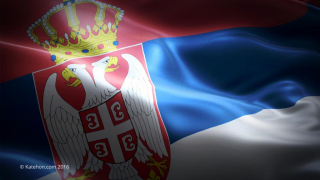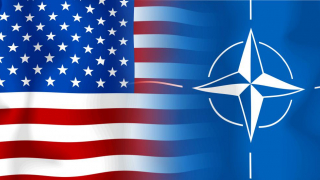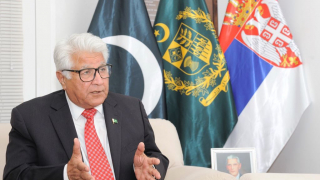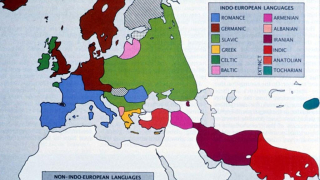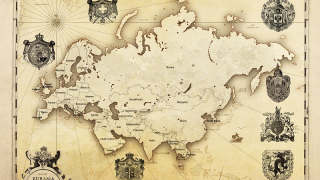European Union against Europe
Right after putsch of 5th October 2000, which ousted President of the Federal Republic of Yugoslavia Slobodan Milosevic, Serbian new government is formed and it is starts very openly to proclaim its foreign policy priorities: guidance Serbia into "Euro-Atlantic integration", "partnership" with the EU and the USA, neglect traditional relations with Russia, and a newly established with the China... For the condition of all conditions, conditio sine qua non, immediately is declared a "road to Europe", the EU accession. That goal – especially in one layer of Serbian society – got almost mystical significance. "Becoming part of the European family" meant, in effect, become part of the "modern Western world", integration into western empire, even at the cost of denying own identity, in that join with the winner.
Europe as oxygen
Zoran Djindjic, Serbia's new Prime minister, made a number of unequivocal statements which were more or less consistently implemented in the practice: "My priority is to remove all obstacles that lead against rapid return of the country to Europe, without thinking are those obstacles are set in the justified or in unjustified manner".
The rhetoric of the new government, especially of new Prime Minister, was uncompromising and fanatic: "Our goal is, and we see our country in 2004 year as an official candidate for the European Union, and in the 2010 as an equal member of the European Union. Any obstacles on the way we will remove, even if they called Milosevic, or constitutions, or be called laws. There is no obstacle that can stop us in this way. As the man which was kept under the water fifty years, in his desire to breathe, to the oxygen, and Serbia cannot be stopped on its way to the oxygen, which is Europe, which is a family of democratic, modern, developed countries".
The first "democratic", "colored" revolution from the very beginning had a clear geopolitical orientation, but there was no strategy which with it be able to achieve the declared goals. It is characteristic that the debate about the European Union in the Serbian media, from October 2000, has never been conducted; in the stead of it was a choir, orchestrated campaign, with dubious effects. The question of Serbia's accession to the EU (according to the established practice in all countries which were candidates) has never become the subject of referendum. Thus, the "first democratic Prime minister of Serbia", after the elections in December 2000, even in an atmosphere of emergency – "the `democratic` atmosphere of crisis staffs, lynch of opposition, media blackout, that would not be recorded in the darkest periods of Milosevic`s dictatorship`" (Mario Kalik: "Myths of Zoran Djindjic") – managed to win „the ninety percent of the government, power, with barely fifteen percent support of the electorate."
To the nameless territory
Over the next ten years, Serbia, mostly unsuccessfully, and as a rule, with the damage on its own interests, leaving the decisions of all important matters to the Brussels administration, followed the path outlined by Zoran Djindjic. In practice, this has meant brutal inserting of the liberal model, in till predominantly socialistic economy and complete submission to the dictates of Washington and Brussels, in domestic and foreign policy sphere.
Some of the consequences of policies that "Europe has no alternative" it is difficult to assess: it is the case with the introduction of European standards in the legislation, which has been reduced to a mechanical adoption of "European laws", even when they were unenforceable in the practice. Elsewhere, again, the damage was obvious and measurable: the unilateral acceptance of the Stabilisation and Association Agreement was cause of the loss of millions in already collapsed Serbian economy. The real goal, however, was a much deeper: to change the mentality of the people, as was discussed in government circles, which needed to become like a "normal nations" (read: Western European nations), by using the methods of social engineering and ignoring whole history and tradition.
Today, a decade after the death of Zoran Djindjic, the goals are as elusive as were in the beginning of his "democratic revolution". The negotiations (which failed) conducted in Brussels with Pristina authorities, under the auspices of the EU and with the strong control of Washington, finally confirmed that the cost of joining the EU and, presumably, the NATO, is the dissolution of territory which belongs to Serbia – as the condition has not so far set to no one candidate country (nor any other country accepted it). In addition, Serbia today provides image of the de-industrialized, impoverished, politically unstable country, with very large unemployment.
In fact, the "European Serbia" from the very beginning was doomed to fail, except at the cost of converting the Serbia in the territory without a name, with an equally vague population. Serbia, in the final, was deprived of the armed forces (the remains of it is assimilated by the NATO standards, for its future participation in military interventions around the world and a subsequent, potentially connection with the Alliance), and was also devoid of autonomous political will and ability to respond to the current challenges. The perspective is new tearing of its territory, on a number of autonomous and completely independent "European regions", according to the principles, the pattern which were introduced, for Serbia only, by Yugoslavia dictator Tito.
Zoran Djindjic was assassinated in March of 2003. Meanwhile, about his personality is created a real cult. He was elevated to a symbol of the pro-Western, "European Serbia", its true icon. His followers use the incendiary rhetoric of the nineties, rejecting discussion and rational arguments. They claim how "Djindjic's vision" will be achieved (the term "Djindjic's vision" was coined after his assassination), if only he has not died under such tragic circumstances, and these claims just do not correspond to the reality: events were not developed in that direction. Djindjic's successor list, ending with Boris Tadic, is made up from the people of very different abilities, but they all were equally committed and equally unsuccessful, in their works and efforts toward the "Euro-Atlantic integration of Serbia".
Elita without idea
Faced with the failure of the "European Serbia" and the deep crisis that just discomfort European Union political elite act by inertia, pointing their eyes to Brussels. The truth is that they do not have any other program, concept or idea. In the meantime, these new circumstances were pushed and Zbigniew Brzezinski to fundamentally revise his views, and even Hillary Clinton was preferred to speak of "multilateralism". But, Serbian elite not changed even its language, and is the question how much they are aware of the dramatic changes in the world's relations.
Serbian political elite cannot be compared with any other layer of the society. And it has no any particular properties or characteristics, intellectual, mental, moral, or ethical. It is not social class or stratum, not elite, not even a closed club. Do not stand out with its education or knowledge, has no precise idea of the challenges with which is faced country and has no awareness of its own friends or enemies, or the ability to detect them. Hence, glides easily from an error in the second error, from one defeat to another defeat. Same was, more or less, and in the second half of the XX century, especially during Tito's time. Contemporary political elite in Serbia, with rare exceptions, is derived from the class of faceless officials, "the socio-political workers" of Tito era.
Serbian political elite does not represent its own people, nation and was not rooted in it. It does not know the history, despise its own heritage and tradition, easily accepting any abstract concept, Marxism or self-management, Yugoslavia or the market economy, liberal or model of European integration. Despite all this, it has no idea or ideology, but use all on pragmatical and cynical way, manner, only for its own purposes.
United States of Europe
The EU is the result of different, sometimes quite contradictory efforts of Western countries to resolve the challenges of the Cold War, and then and challenges of the unipolar world. Today, it is an instrument of Westernization and has nothing in common with traditional European values, with its heritage and culture, it is, in fact, their negation in favor of "new" and "liberal Europe". Today's EU is a totalitarian, bureaucratic structure, which implements a very rigid ideological option, one liberal, and in the foreign policy openly follows pro-Atlantic policy, and that is clearly demonstrated during the war in the Balkans, Iraq, Libya, Syria...
In other words, on the both plans, the EU appears to be a trans-oceanic province, periphery or colony of the United States, an extension of the America on the Eurasian continent
In geopolitical terms, Europe is not constituted as separate "big space”. Paradoxically, it not made even political union, while remaining firmly integrated into the transatlantic structures such as NATO. The question is whether it will ever succeed to be politically united. It's position makes it ambiguous and contradictory. Europe simply does not have the strength to be formed as a separate factor, as an independent political entity other than the United States. As noted French philosopher Alain de Benoist: "The European Union has created from the start as opposed to common sense. We wanted to start with the economy and trade, instead of taking as start point the politics and culture. We wanted to create Europe from above, giving all the powers to the Commission in Brussels, which has no democratic legitimacy, rather than to go from the bottom, i.e. of communities regions and nations". Such as it is, the EU is a relict of the Cold War and a unipolar world, although, in reality, the European strategic and geopolitical interests are fundamentally different from the U.S interests. In short: "Europe is today the body without sovereignty, which hit and weakness and paralysis" (Alan de Benoist).
The whole project of "European unity" needs to be revised, and the EU itself must be fundamentally reformed. The crisis that was just hits it, the deepest one, since its establishment, make highly uncertain and survival of the EU, and there is no doubt that the crisis is closely linked with the decline of American empire and with the rise of new centers of power. We can remind how financial and economic crisis, which was began 2008 in the U.S., was very fast spilled over the European Union.
In other words, the EU has never become more than a "common market". It does not present any unique cultural, political and even military factor. Its possible breakup scenario is therefore more certain. And with the insistence on such, the liberal concept of the EU raises the prospect of EU disintegration into several distinct geopolitical blocks. However, all hope for the establishment of a "Great Europe", represented by the European Union, are now buried. It is only an instrument of the unipolar world, led by America.
West against the „rest of the world“
Creating of Eurasia Alliance, in our opinion, is a decisive stage in the creation of future multipolar world. Without the Eurasian Union, as a new pole “polar point” in the multipolar world, all that might not have been possible. EU member states, each of them will have to decide, to determine about this fact: they will, either, like the U.S., set them self as not hostile, trying in every way to prevent the creation of a new geopolitical pole, or will be, like China, for cooperation.
Creating of the Eurasia alliance is a key step. According to this new fact will have to be determined and countries such is Serbia, located in the transition zone – the area of Eastern Europe, between Western Europe and Eurasia.
Serbia's position in such reality is in many ways paradoxical. It is, regardless of the change at the top of political power – although we accept the arrival of Tomislav Nikolic as president of Serbia as a welcome development – but Serbia received that moment as totally unprepared. The political elite in Serbia has no any alternative geopolitical project, and so far is not ready for a radical turn, although it is obvious that its accession to the European Union finally came into the “blind alley”.
This question will, in our opinion, in the very near future become crucial to Serbia. On it will go up or down the new political elite. Waiver of "European integration" and turning to the Eurasian Union emerging today as imperative, if Serbia wants to preserve its sovereignty and independence, its identity and territorial integrity. The President of the Republic of Srpska Milorad Dodik is perfectly summed up here, really non-existent, the dilemma: "Why we need Europe if we do not have state?" President Dodik conclusion is unequivocal: "Serbia needs to strengthen its capacities and turn them over to the East. After all, it seems, that’s start to do and Europe. The same West has pushed us into very rapid privatization, which has as effect devastated economy. Steeled our economy by buying our companies for `next to nothing`, they now would take and our state, with the impose of EU directives (...) But, is enough of that fanaticism and belief that we cannot live without the EU“.
We can agree with the statement that we are now entering into phase of global instability, a phase of dramatic change, the inevitable redistribution of global power. It can be considered a third world war, regardless of whether the conflict remain regional, or we really can get into a nuclear superpowers confrontation. It is a struggle between the West globalization and multipolarism, among Western powers, led by the U.S., against the "rest of the world," against Eurasia. In that conflict, Serbia cannot stand idly by, nor will it be able to maintain a neutral position. The present position of Serbia and the dynamics of the conflict drives Serbia today to abandon EU integration and to take the first steps toward membership in the Customs Union, to join the Collective Security Treaty Organization, in order to become a full part of tomorrow Eurasian Union.
Translated by Vesna S. Disic.




